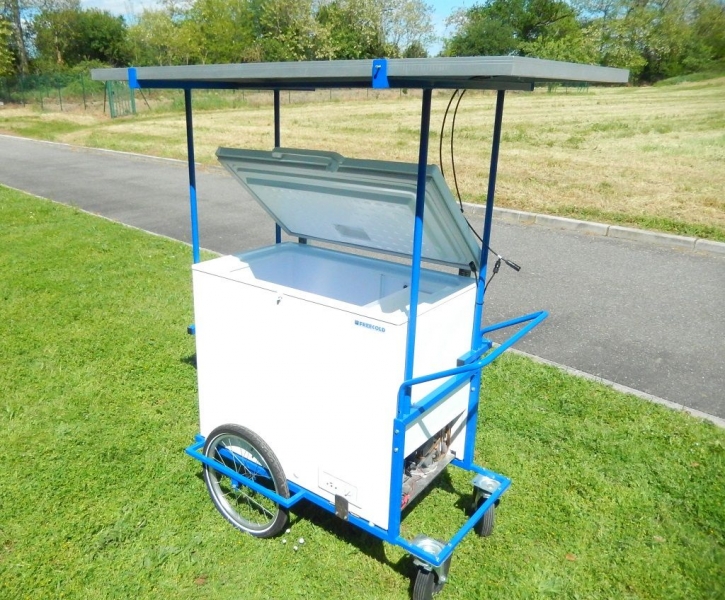Discover the Trick Advantages of Implementing Solar Fridge in Your Energy Approach
Incorporating solar refrigerators right into a power method offers a wide variety of advantages that expand past simple price savings. These systems not only add to reduced carbon discharges but also boost energy freedom by using sustainable solar power. Their integrity throughout power outages and reduced upkeep demands make them suitable for varied setups, from domestic to commercial. As organizations increasingly focus on sustainability, comprehending the broader effects of solar refrigeration could redefine power intake practices. What are the particular advantages that could change your strategy to energy monitoring?
Environmental Influence
Minimizing carbon exhausts is one of one of the most substantial advantages of solar refrigerators, as these home appliances operate making use of renewable resource sourced from the sunlight. Unlike conventional fridges that count on fossil fuels or grid electricity, solar refrigerators harness solar energy, therefore decreasing the carbon impact connected with energy intake. This shift to renewable resource contributes to a decrease in greenhouse gas emissions, which is critical in combating climate modification.
In addition, solar fridges offer a sustainable service in regions with minimal accessibility to power. By offering trusted refrigeration without the requirement for conventional source of power, they aid preserve food and medicines, thereby improving food security and public wellness. Making use of solar energy also decreases dependence on non-renewable sources, promoting an extra sustainable power landscape.
Additionally, the production and procedure of solar refrigerators often tend to have a lower ecological impact compared to standard models. By making use of products that can typically be reused and carrying out energy-efficient modern technologies, these home appliances add to the overall reduction of waste and air pollution. Subsequently, the ecological benefits of solar fridges expand past their initial procedure, fostering a greener economic situation and sustaining ecological conservation initiatives (solar refrigerator).
Expense Cost Savings

The preliminary investment in a solar refrigerator might be more than traditional designs; nevertheless, the long-lasting cost savings on power expenses can promptly counter this cost. In addition, solar fridges commonly feature reduced upkeep demands, as they have fewer moving parts contrasted to standard systems. This causes lowered repair work expenses over their life expectancy.
Furthermore, solar refrigerators are specifically helpful in remote or off-grid locations where power access can be limited or pricey (solar refrigerator). In such situations, the expense of establishing up a solar fridge can be considerably lower than linking to the grid or relying on diesel generators
Inevitably, the expense savings generated by solar fridges not just improve monetary sustainability yet additionally add to a much more reliable energy approach. As the modern technology remains to breakthrough, these financial savings are most likely to enhance, making solar refrigerators an increasingly appealing alternative for energy-conscious consumers.
Power Freedom
The dependence on solar power for refrigeration not only leads to substantial price savings but additionally promotes higher power freedom for individuals. By using solar energy, individuals and organizations can reduce their reliance on standard energy resources, which are typically based on rate variations and supply unpredictabilities. This shift allows individuals to mitigate the impacts of climbing power prices and possible shortages related to standard power grids.
Implementing solar fridges makes it possible for customers to create their own power, giving a self-sufficient service that is specifically helpful in remote see here or off-grid areas. This independence from the central power grid encourages users to keep regular refrigeration without disruptions triggered by power blackouts or grid failures. Consequently, solar refrigerators can play a vital function in improving food safety by guaranteeing that disposable items continue to be maintained despite external energy problems.

Reliability and Longevity
Solar refrigerators are renowned for their reliability and resilience, making them an engaging selection for both residential and industrial applications. These appliances are created to stand up to a selection of environmental conditions, guaranteeing constant performance with time. The lack of moving components in their solar-powered devices minimizes deterioration, considerably expanding their life expectancy compared to standard fridges.
Producers often utilize premium materials and durable building techniques, which additionally enhance the strength of solar refrigerators. Several designs are built to resist severe temperatures, moisture, and even rust, specifically those planned for outdoor or remote installations. This longevity is critical, especially in areas with limited accessibility to repair solutions or replacement parts.
Additionally, solar refrigerators commonly feature service warranties that mirror their reliability, providing individuals with comfort concerning their investment - solar refrigerator. Customers can rely on these systems for nonstop service, even throughout power outages or in off-grid areas. Because of this, incorporating solar fridges right into your power strategy not only advertises sustainability however additionally makes sure that your refrigeration requires can be satisfied dependably and efficiently over the long term
Versatility and Ease Of Access
A standout attribute of solar refrigerators is their exceptional versatility and access, making them suitable for a vast array of applications. These energy-efficient devices can be made use of in various setups, from property homes and remote cabins to commercial facilities and outside occasions. Their read review capacity to run individually of standard source of power enables them to flourish in off-grid areas, where conventional refrigeration choices might be unwise or inaccessible.
Moreover, solar refrigerators come in varied dimensions and setups, accommodating the requirements of various users. Whether for maintaining food and drinks in a home or preserving the chilly chain in medical centers, these devices can be tailored to meet certain demands. Their transportability even more enhances their access, as many versions are created for very easy transport, allowing individuals to make use of solar refrigeration in various atmospheres.

Final Thought
In verdict, the execution of solar refrigerators uses many advantages that line up with lasting power methods. By integrating solar refrigerators into energy services, people and organizations add to a greener economic climate while decreasing dependence on conventional power resources.
Comments on “Power your fridge with a solar refrigerator that works on renewable solar energy.”